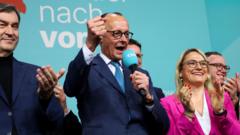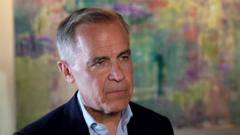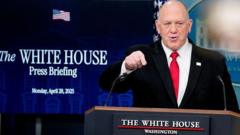The recent German elections saw a victories for the conservative CDU party, although the far-right Alternative for Germany (AfD) achieved record results, posing a significant challenge to the mainstream parties.
Germany's Conservatives Claim Election Win as AfD Sees Record Gains

Germany's Conservatives Claim Election Win as AfD Sees Record Gains
Friedrich Merz of the CDU declares victory after Germany's elections, but far-right AfD celebrates unprecedented support.
Friedrich Merz, leader of Germany's conservative Christian Democrats (CDU), has emerged victorious in the national elections, achieving a notable lead over rival parties but falling short of the expected 30% vote share. He enthusiastically addressed supporters, stating, "Let's celebrate tonight and in the morning, we'll get to work," with forming a government as his immediate priority.
While the CDU is targeting a coalition with the Social Democrats (SPD), whose leader Olaf Scholz faced a disappointing result, the big news from the election is the rise of the far-right AfD, which has recorded its highest-ever support with 20.8% of the vote. Party candidate Alice Weidel celebrated the occasion, but internal expectations were not fully met, leading to a hybrid atmosphere at their headquarters.
Merz, a fresh face in leadership who has never held a ministerial position, emphasizes unity within Europe and aims for Germany to receive increased support, particularly for Ukraine. He has reiterated that American politics have shown indifference towards Europe, citing President Donald Trump's stance on the region. Trump's apparent backing of the AfD has raised concerns about meddling in German elections.
As Merz prepares to take charge, the political landscape in Germany looks challenging, with the CDU needing to unify its coalition despite skeptical voter sentiments. Voter turnout was historic, reflecting a desire for change. The AfD's surge in the east is attributed to discontent over rising costs and violence that has plagued major cities.
Merz depicted the AfD's rise as a symptom of unresolved issues in German society and expressed conviction that addressing these problems will diminish the far-right's influence. Meanwhile, he received congratulations from European leaders who stress the importance of cooperation.
Young voters, however, seem to lean towards the AfD and another leftist party that recently gained traction through viral social media campaigns. This could indicate a shifting political landscape as various demographics express their preferences distinctively.
The general sentiment reveals a divided Germany ahead, with Merz's CDU trying to navigate coalition talks and the rise of opposition parties. With various challenges set before him, it's clear that Merz has a complex road ahead in addressing the nation’s concerns while countering the increasing popularity of the AfD.





















